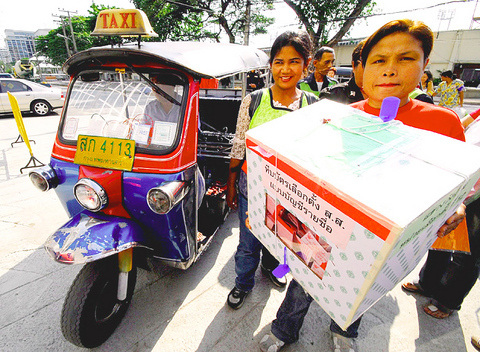Thailand went to the polls yesterday in a snap election called by the country's embattled prime minister, who urged voters to ignore an opposition boycott and end the country's deepening political stalemate.
But the vote was unlikely to satisfy critics who accuse Prime Minister Thaksin Shinawatra of corruption and abuse of power.
"People will not accept this election, and the political situation will get worse," said Banharn Silpa-archa, head of the opposition Chat Thai party, which boycotted the election along with the two other opposition parties in parliament.

PHOTO: EPA
The national police chief warned yesterday that the protests should stop after the vote.
"We should return to the rule of law after the election. Everybody should return to normal and not violate any laws or cause suffering to others," General Kowit Watana told reporters. "Police have been lenient for a very long time."
The balloting was largely peaceful, but bombs exploded after voting ended at three polling stations in the restive south, injuring four soldiers and a police officer, police said.
Thaksin called the election three years early to reassert his mandate after weeks of growing street protests against his leadership.
"I would like to congratulate all Thais that we have successfully maintained democracy," Thaksin said after yesterday's vote. "I would like to call on all sectors in society to respect the rules and respect the people's decision."
The results of unofficial exit polls were expected later yesterday, while official results were not expected until tomorrow, the Election Commission said.
Looking relaxed and smiling, Thaksin cast his ballot at a voting station near his residence in western Bangkok, accompanied by his three children.
The anti-Thaksin movement adopted the slogan "Vote for No Vote," and urged people to wear black on election day as a symbol of protest. A few people did don black but others staged more personal protests. Prominent political science professor Chaiyan Chaiporn of Chulalongkorn University made a show of ripping up his ballot card at a central Bangkok polling station, as other voters erupted in applause. He was promptly arrested but released on bail. The act is punishable by one year in prison, a 20,000 baht (US$500) fine and a five-year revocation of voting rights.

Conflict with Taiwan could leave China with “massive economic disruption, catastrophic military losses, significant social unrest, and devastating sanctions,” a US think tank said in a report released on Monday. The German Marshall Fund released a report titled If China Attacks Taiwan: The Consequences for China of “Minor Conflict” and “Major War” Scenarios. The report details the “massive” economic, military, social and international costs to China in the event of a minor conflict or major war with Taiwan, estimating that the Chinese People’s Liberation Army (PLA) could sustain losses of more than half of its active-duty ground forces, including 100,000 troops. Understanding Chinese

The Ministry of Foreign Affairs (MOFA) yesterday said it is closely monitoring developments in Venezuela, and would continue to cooperate with democratic allies and work together for regional and global security, stability, and prosperity. The remarks came after the US on Saturday launched a series of airstrikes in Venezuela and kidnapped Venezuelan President Nicolas Maduro, who was later flown to New York along with his wife. The pair face US charges related to drug trafficking and alleged cooperation with gangs designated as terrorist organizations. Maduro has denied the allegations. The ministry said that it is closely monitoring the political and economic situation

UNRELENTING: China attempted cyberattacks on Taiwan’s critical infrastructure 2.63 million times per day last year, up from 1.23 million in 2023, the NSB said China’s cyberarmy has long engaged in cyberattacks against Taiwan’s critical infrastructure, employing diverse and evolving tactics, the National Security Bureau (NSB) said yesterday, adding that cyberattacks on critical energy infrastructure last year increased 10-fold compared with the previous year. The NSB yesterday released a report titled Analysis on China’s Cyber Threats to Taiwan’s Critical Infrastructure in 2025, outlining the number of cyberattacks, major tactics and hacker groups. Taiwan’s national intelligence community identified a large number of cybersecurity incidents last year, the bureau said in a statement. China’s cyberarmy last year launched an average of 2.63 million intrusion attempts per day targeting Taiwan’s critical

‘SLICING METHOD’: In the event of a blockade, the China Coast Guard would intercept Taiwanese ships while its navy would seek to deter foreign intervention China’s military drills around Taiwan this week signaled potential strategies to cut the nation off from energy supplies and foreign military assistance, a US think tank report said. The Chinese People’s Liberation Army (PLA) conducted what it called “Justice Mission 2025” exercises from Monday to Tuesday in five maritime zones and airspace around Taiwan, calling them a warning to “Taiwanese independence” forces. In a report released on Wednesday, the Institute for the Study of War said the exercises effectively simulated blocking shipping routes to major port cities, including Kaohsiung, Keelung and Hualien. Taiwan would be highly vulnerable under such a blockade, because it